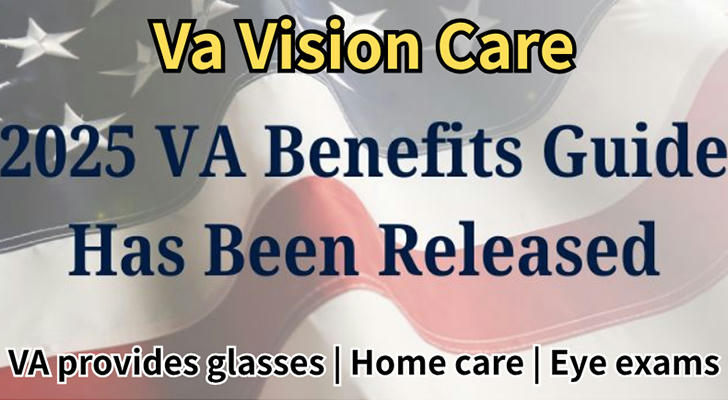🕶️ Comprehensive Guide to Veterans Affairs Vision Care and Eyewear Support 2025
VA provides glasses | Home care | Eye exams

Veterans have served the nation with dedication, and their health deserves proper care. The U.S. Department of Veterans Affairs (VA) offers a range of vision care services to eligible veterans, including eye exams, eyeglass coverage, and visual rehabilitation, helping them maintain independence and improve quality of life.
1.VA Blindness and Low Vision Rehabilitation Services
If you are a blind or low-vision veteran or active-duty service member, the VA provides advanced vision care and rehabilitation services to help you live more independently.
VA’s advanced vision care services include:
📖 Vision enhancement devices and technology (such as electronic reading devices and electronic mobility aids) along with training on how to use them
🧭 Training new visual skills to assist with daily tasks like reading, writing, cooking, medication management, and recognizing signs
👂 Sensory training to better use other senses such as hearing or touch
🧠 Mobility and orientation training to help create mental maps, increasing confidence when navigating different environments
💻 Strategies to regain communication abilities through writing or computer use
💬 Counseling and group therapy to help adjust to blindness
🏠 Family-centered care to assist your loved ones in supporting you through your adjustment
Treatment can be provided on an outpatient basis or as short-term inpatient care, depending on your needs.
2.Does the VA Cover Eyeglass Costs?
The VA will cover your eyeglass costs if you meet any of the following conditions:
✅Service-Related Qualifications (any one):
Service-connected disability related to your military service
Former prisoner of war (POW)
Awarded the Purple Heart
Receiving benefits under U.S. Code Title 38, Section 1151
Receiving increased pension due to need for regular aid and attendance
✅Health Condition Qualifications (any one):
① Vision problems caused by diseases or treatments, such as stroke, diabetes, multiple sclerosis, vascular diseases, or chronic conditions of aging
② Vision issues resulting from injury or treatment, including reactions to medications, cataract or other eye/ear/brain surgeries, traumatic brain injuries, or multiple traumas
③ Functional or cognitive impairments severe enough to impact daily tasks
④ Severe combined vision and hearing loss (dual sensory loss) that affects your ability to participate actively in your healthcare, and eyeglasses can help mitigate the impairment
📍 For more details, contact your nearest VA medical center or prosthetics representative.
3.How to Apply for VA Vision Care Services?
Enroll in the VA healthcare system and confirm eligibility;
Contact your primary care provider to assess if an eye care referral is needed;
Prepare necessary documents, such as your DD214, insurance details, and household income;
Submit your application via:
Online: VA Application Page
Phone: 877-222-8387
Mail or in person: Submit the signed VA Form 10-10EZ
4.Vision Care Needs for Veterans Over 50: Age-Specific Insights
👓Ages 50–60: Focus on Prevention
Common presbyopia and eye strain issues
Annual retinal exams recommended for preventive care
🩺Ages 61–70: Maintaining Function
Early-stage cataracts and multiple health conditions affecting vision
Use of assistive devices and regular vision monitoring advised
🦯Ages 71–80: Enhancing Quality of Life with Technology
Adapting to post-surgical changes and color vision decline
VA provides magnifiers, screen readers, and orientation aids
🧓Ages 81 and Above: Home-Based Rehabilitation
Increasing rates of severe vision loss or blindness
Access to home evaluations and caregiver training by rehabilitation specialists
5.Real-Life Examples: How Veterans Benefit from Vision Services
📌Case One: Mike (62, Vietnam Veteran) Mike suffered severe left-eye injury related to service, rated 100% disabled. Through the VA, he received customized eyeglasses and regular check-ups. He said, "These are the best glasses I've ever had. VA gives me peace of mind."
📌Case Two: Maria (48, Gulf War Veteran) Maria’s diabetes affected her vision. The VA enrolled her in a low vision rehabilitation program offering magnifiers and orientation training. She returned to work at a library, saying, "VA’s services were a turning point for my independence."
6.Conclusion: Clear Vision, Preserved Dignity
Vision health is fundamental to veterans’ independence and dignity. The VA provides comprehensive services from basic exams to rehabilitation training, helping veterans see clearly and live confidently.
📌Take action now: enroll, get evaluated, apply, and ensure your vision care needs are met.
